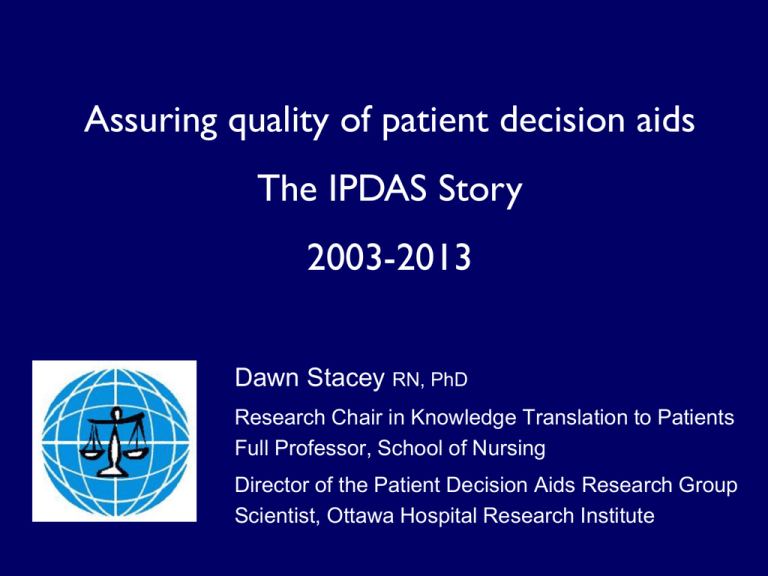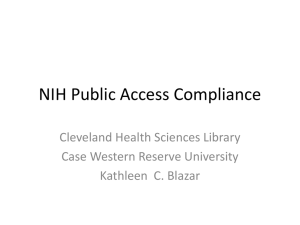Dawn-Stacey-Presentation-3-Assuring-Quality-of
advertisement

Assuring quality of patient decision aids The IPDAS Story 2003-2013 Dawn Stacey RN, PhD Research Chair in Knowledge Translation to Patients Full Professor, School of Nursing Director of the Patient Decision Aids Research Group Scientist, Ottawa Hospital Research Institute International Patient Decision Aid Standards To enhance the quality and effectiveness of patient decision aids by establishing a shared evidenceinformed framework for improving their content, development, implementation, and evaluation. IPDAS Steering Committee: Glyn Elwyn & Dawn Stacey (Co-Leads), M Barry, N Col, A Coulter, K Eden, M Härter, M Holmes-Rovner, H Llewellyn-Thomas, V Montori, N Moumjid, M Pignone, R Thomson, L Trevena, R Volk, T van der Weijden IPDAS Phases 2003-2006 Developing the Checklist (modified Delphi process) 2006-2009 Developing the Instrument (psychometric evaluation) 2009-2013 Agreeing Minimal Standards (modified Delphi process) 2011-2013 Updating evidence underlying the IPDAS checklist (knowledge synthesis) International Patient Decision Aids Standards Collaboration (IPDAS) Objective: To establish internationally approved criteria to determine the quality of patient decision aids. These criteria are helpful to individuals and organizations that use and/or develop patient decision aids: – Patients – Practitioners – Developers – Researchers – Policy makers or payers >100 participants from 14 countries To learn more, visit: ipdas.ohri.ca Elwyn, et al., BMJ. 2006 Aug 26; 333(7565):417. http://www.ncbi.nlm.nih.gov/pubmed/16908462 International Patient Decision Aids Standards Collaboration Quality Criteria 12 Dimensions Essential Content Generic Criteria – Development process – Information – Disclosure – Probabilities – Internet delivery – Values clarification – – Balance Guidance – Patient Stories Effectiveness Criteria – Decision process – Decision quality – Plain language – Up to date evidence Elwyn, et al., BMJ. 2006 Aug 26; 333(7565):417. http://www.ncbi.nlm.nih.gov/pubmed/16908462 International Patient Decision Aid Standards (IPDAS) presenting probabilities The patient decision aid presents probabilities … No Yes 1.…using event rates… 2. …using the same denominator 3. …over the same period of time 4. …with uncertainty 5. …using visual diagrams (e.g. faces, bar charts) 6. …using the same scales 7. …with more than 1 way of viewing probabilities (e.g. words, numbers, diagrams). 8. …based on patient’s own situation (e.g. specific to their age or severity of their disease) 9. …using both positive and negative frames (Elwyn et al., (2006) in BMJ 333(7565):417; Trevena et al. (2006) in J Eval Clin Practice) Prostate Cancer Knowing Your Options: A Decision Aid for Men With Clinically Localized Prostate Cancer Agency for Healthcare Research and Quality (AHRQ) Localised prostate cancer - low risk Option Grid Collaborative IPDAS Phases 2003-2006 Developing the Checklist 2006-2009 Developing the Instrument 2009-2013 Agreeing Minimal Standards 2011-2013 Updating evidence underlying the IPDAS checklist IPDASi uses a 4-point scale with items descriptors (strongly agree to strongly disagree) Elwyn, et al., PLoS One. 2009;4(3):e4705. http://www.ncbi.nlm.nih.gov/pubmed/19259269 IPDAS Phases 2003-2006 Developing the Checklist 2006-2009 Developing the Instrument 2009-2013 Agreeing Minimal Standards 2011-2013 Updating evidence underlying the IPDAS checklist IPDAS v4.0 Items across the 3 Categories Dimensions Information Probabilities Values Guidance Development Evidence Disclosure Plain Language Evaluation Test Totals # of Criteria / Category Qualifying Certification Quality 5 1 2 6 1 2 6 2 1 1 2 5 28 1 4 1 6 4 10 Joseph-Williams, et al., MDM. 2013 Aug 20. https://www.ncbi.nlm.nih.gov/pubmed/23963501 Summary of qualifying criteria 1. describes the health condition or problem 2. explicitly states the decision that needs to be considered 3. describes the options available 4. describes the positive features 5. describes the negative features 6. describes what it is like to experience the consequences Joseph-Williams, et al., MDM. 2013 Aug 20. https://www.ncbi.nlm.nih.gov/pubmed/23963501 Summary of certifying criteria 1. equal detail for negative and positive features of options 2. citations to the evidence 3. production or publication date 4. update policy 5. information about uncertainty around probabilities 6. funding source used for development For screening decision aids 7. 8. 9. 10. describes what the test is designed to measure next steps after positive test result next steps after negative test result consequences of detecting a benign condition Joseph-Williams, et al., MDM. 2013 Aug 20. https://www.ncbi.nlm.nih.gov/pubmed/23963501 IPDAS Phases 2003-2006 Developing the Checklist 2006-2009 Developing the Instrument 2009-2013 Agreeing Minimal Standards 2011-2013 Updating evidence underlying the IPDAS checklist 2013 Peer-reviewed Publications for IPDAS Collaboration’s Quality Dimensions BMC Medical Informatics and Decision Making 2013, 13(Suppl 2). http://www.biomedcentral.com/bmcmedinformdecismak/supplements/13/S2 Proposed National Certification Process for patient decision aids 1. Setting criteria for certification – IPDAS 2. Assessing content 3. Certifying every decision aid or certifyign producer processes 4. Establishing new entity or new function for existing entity (e.g. in the US - National Quality Forum; National Committee for Quality Assurance) Alston et al., 2014 Shared Decision-Making Strategies for Best Care: Patient Decision Aids and Beyond. IOM Discussion Paper http://ipdas.ohri.ca








